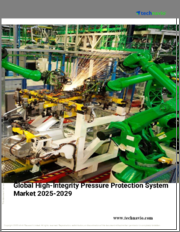
|
시장보고서
상품코드
1725098
고신뢰성 압력 보호 시스템 시장 예측(-2032년) : 유형별, 제품별, 시스템 구성별, 용도별, 최종 사용자별, 지역별 분석High Integrity Pressure Protection System Market Forecasts to 2032 - Global Analysis By Type (Electronic HIPPS, Hydraulic/Mechanical HIPPS, and Other Types), Offering, System Configuration, Application, End User and By Geography |
||||||
Stratistics MRC에 따르면 세계의 고신뢰성 압력 보호 시스템 시장은 2025년 5억 4,571만 달러를 차지하고, 2032년에는 10억 1,696만 달러에 이를 것으로 예측되며, 예측 기간 중 CAGR은 9.3%로 성장할 전망입니다.
고신뢰성 압력 보호 시스템(HIPPS)은 압력원이 안전 한계를 초과하기 전에 격리하여 파이프라인 및 처리 시스템의 과압을 방지하도록 설계된 안전 계장 시스템입니다. 센서가 위험한 레벨을 감지하면 자동으로 압력 힘원을 차단하고 최후의 방어 라인으로서 기능합니다.
석유 및 가스 분야에서 수요 증가
석유 및 가스 섹터에서의 고신뢰성 압력보호시스템(HIPPS) 수요증대는 안전성과 작업효율 향상에 대한 요구가 원동력이 되고 있습니다. 보다 엄격한 안전 대책을 의무화하는 규제 요건이 시장의 성장을 더욱 뒷받침하고 있습니다.
높은 설치 비용과 유지 보수 비용
HIPPS의 채용은 중소기업에 있어서 장벽이 될 수 있는 다액의 설치 및 보수 비용에 의해 방해되고 있습니다. HIPPS의 설치와 서비스에는 숙련공이 필요하기 때문에 경제적 부담도 커집니다.
에너지 인프라 투자 증가
세계 에너지 인프라 투자의 급증은 HIPPS 시장에 큰 성장 기회를 가져오고 있습니다. 수소 파이프라인과 같은 신재생에너지 통합에 대한 주목의 고조도, 첨단 압력 보호 시스템에 대한 수요를 창출하고 있습니다.
대체 압력 보호 시스템의 가용성
HIPPS 시장은 보다 경제적이라고 생각되는 경향이 있는 기존의 압력 릴리프 밸브 및 기타 기계적 안전 시스템과의 경쟁에 직면하고 있습니다. 또한 랩처 디스크 및 분출 방지 장치와 같은 대체 기술의 진보가 HIPPS 채택에 위협을 가하고 있습니다.
COVID-19의 영향
팬데믹은 처음에는 공급망의 혼란과 프로젝트의 연기로 HIPPS의 채용을 늦추었습니다. 는 자동화되고 원격 감시된 HIPPS 솔루션에 대한 수요를 가속화했습니다.
예측 기간 동안 싱글 채널 시스템 부문이 최대가 될 전망
싱글 채널 시스템 분야는 그 비용 대비 효과와 심플한 설계로 예측 기간 중 최대 시장 점유율을 차지할 것으로 예측됩니다. 복잡성이 낮기 때문에 설치 및 유지 보수 노력이 줄어들고 예산에 중점을 둔 최종 사용자에게 매력적인 제품이기도합니다.
예측 기간 중 의약품 분야의 CAGR이 가장 높아질 전망
예측 기간 동안 의약품 분야는 의약품 제조에서의 엄격한 규제 기준에 견인되어 가장 높은 성장률을 나타낼 것으로 예측됩니다.
최대 점유율 지역:
예측기간 동안 급속한 산업화와 석유 및 가스 활동 확대로 아시아태평양이 최대 시장 점유율을 차지할 것으로 예측됩니다. 이 지역의 제약 및 화학 산업의 성장도 시장 확대에 기여하고 있습니다.
CAGR이 가장 높은 지역:
예측 기간 동안 북미가 가장 높은 CAGR을 나타낼 것으로 예측되며, 이는 기술의 진보와 엄격한 안전 규제 때문입니다. 이 지역은 환경 리스크의 저감과 조업의 안전성 강화에 주력하고 있으며, 시장의 성장을 가속시키고 있습니다.
무료 사용자 정의 서비스:
이 보고서를 구독하는 고객은 다음 무료 맞춤설정 옵션 중 하나를 사용할 수 있습니다.
- 기업 프로파일
- 추가 시장 기업의 종합적 프로파일링(3개사까지)
- 주요 기업의 SWOT 분석(3개사까지)
- 지역 세분화
- 고객의 관심에 응한 주요국 시장 추계 및 예측, CAGR(주: 타당성 확인에 따름)
- 경쟁 벤치마킹
- 제품 포트폴리오, 지리적 존재, 전략적 제휴에 기반한 주요 기업 벤치마킹
목차
제1장 주요 요약
제2장 서문
- 개요
- 이해관계자
- 조사 범위
- 조사 방법
- 데이터 마이닝
- 데이터 분석
- 데이터 검증
- 조사 접근
- 조사 자료
- 1차 조사 자료
- 2차 조사 정보원
- 전제조건
제3장 시장 동향 분석
- 성장 촉진요인
- 억제요인
- 기회
- 위협
- 용도 분석
- 최종 사용자 분석
- 신흥 시장
- COVID-19의 영향
제4장 Porter's Five Forces 분석
- 공급기업의 협상력
- 구매자의 협상력
- 대체품의 위협
- 신규 참가업체의 위협
- 경쟁 기업간 경쟁 관계
제5장 세계의 고신뢰성 압력 보호 시스템 시장 : 유형별
- 전자 HIPPS
- 유압 및 기계식 HIPPS
- 기타 유형
제6장 세계의 고신뢰성 압력 보호 시스템 시장 : 제품별
- 컴포넌트
- 압력 센서 및 트랜스미터
- 로직 솔버
- 기타 컴포넌트
- 서비스
- 시험, 검사, 인증(TIC)
- 유지보수
- 교육 및 컨설팅
제7장 세계의 고신뢰성 압력 보호 시스템 시장 : 시스템 구성별
- 싱글 채널 시스템
- 중복 안전 시스템
- 듀얼 채널 시스템
- 트리플 채널 시스템
제8장 세계의 고신뢰성 압력 보호 시스템 시장 : 용도별
- 석유 및 가스
- 발전
- 화학처리
- 물 및 폐수 처리
- 식음료
- 의약품
- 금속 및 광업
- 기타 용도
제9장 세계의 고신뢰성 압력 보호 시스템 시장 : 최종 사용자별
- 업스트림
- 미드스트림
- 다운스트림
- 기타 최종 사용자
제10장 세계의 고신뢰성 압력 보호 시스템 시장 : 지역별
- 북미
- 미국
- 캐나다
- 멕시코
- 유럽
- 독일
- 영국
- 이탈리아
- 프랑스
- 스페인
- 기타 유럽
- 아시아태평양
- 일본
- 중국
- 인도
- 호주
- 뉴질랜드
- 한국
- 기타 아시아태평양
- 남미
- 아르헨티나
- 브라질
- 칠레
- 기타 남미
- 중동 및 아프리카
- 사우디아라비아
- 아랍에미리트(UAE)
- 카타르
- 남아프리카
- 기타 중동 및 아프리카
제11장 주요 발전
- 계약, 파트너십, 협업, 합작투자
- 인수와 합병
- 신제품 발매
- 사업 확대
- 기타 주요 전략
제12장 기업 프로파일링
- EmersonElectricCo
- Larsen & ToubroLimited
- YokogawaElectricCorporation
- MokveldValvesBV
- SchneiderElectric
- SevernGloconGroup
- RockwellAutomation
- MOGASIndustries
- HIMA
- HoneywellInternational
- Schlumberger
- FramesGroup
- SiemensAG
- BakerHughes
- ABB
According to Stratistics MRC, the Global High Integrity Pressure Protection System Market is accounted for $545.71 million in 2025 and is expected to reach $1016.96 million by 2032 growing at a CAGR of 9.3% during the forecast period. A High Integrity Pressure Protection System (HIPPS) is a safety instrumented system designed to prevent overpressure in pipelines and processing systems by isolating the source of pressure before it exceeds safe limits. It acts as a last line of defence, automatically shutting off pressure sources when sensors detect dangerous levels. HIPPS is widely used in oil and gas, chemical, and power industries to enhance safety, reduce environmental risks, and comply with stringent regulatory standards for high-risk operations.
Market Dynamics:
Driver:
Growing demand in oil & gas sector
The increasing demand for High Integrity Pressure Protection Systems (HIPPS) in the oil & gas sector is driven by the need for enhanced safety and operational efficiency. As exploration and production activities expand into high-pressure environments, HIPPS provides critical overpressure protection, reducing reliance on traditional mechanical relief systems. Regulatory requirements mandating stricter safety measures further propel market growth. Additionally, the shift toward unconventional oil & gas resources, such as shale and deepwater reserves, necessitates advanced pressure management solutions.
Restraint:
High installation and maintenance costs
The adoption of HIPPS is hindered by its substantial installation and maintenance expenses, which can be a barrier for small and medium-sized enterprises. The system requires specialized components, including high-performance valves, sensors, and control units, contributing to elevated upfront costs. Additionally, regular maintenance and calibration are essential to ensure reliability, further increasing operational expenditures. The need for skilled personnel to install and service HIPPS adds to the financial burden. Some end-users may opt for conventional pressure relief systems due to cost concerns, limiting market penetration.
Opportunity:
Rising investments in energy infrastructure
The global surge in energy infrastructure investments presents a significant growth opportunity for the HIPPS market. Governments and private entities are funding new oil & gas projects, LNG terminals, and pipeline networks, where HIPPS plays a crucial role in ensuring operational safety. The increasing focus on renewable energy integration, such as hydrogen pipelines, also creates demand for advanced pressure protection systems. Technological advancements, such as smart HIPPS with IoT-enabled monitoring, enhance system efficiency and attract further investments.
Threat:
Availability of alternative pressure protection systems
The HIPPS market faces competition from conventional pressure relief valves and other mechanical safety systems, which are often perceived as more economical. Some industries may prefer traditional methods due to familiarity and lower initial costs, despite their limitations in high-pressure applications. Furthermore, advancements in alternative technologies, such as rupture discs and blowout preventers, pose a threat to HIPPS adoption. The lack of stringent regulations in certain regions may also reduce the urgency for upgrading to HIPPS.
Covid-19 Impact
The pandemic initially delayed HIPPS adoption due to supply chain disruptions and project postponements. However, the energy sector's recovery renewed focus on safety systems like HIPPS. Digital transformation accelerated demand for automated and remote-monitored HIPPS solutions. Post-pandemic, industries prioritize operational resilience, strengthening HIPPS market prospects. Despite short-term setbacks, long-term growth remains positive.
The single-channel systems segment is expected to be the largest during the forecast period
The single-channel systems segment is expected to account for the largest market share during the forecast period, due to its cost-effectiveness and simplicity in design. These systems are widely adopted in applications where moderate safety integrity levels (SIL) are sufficient, such as midstream oil & gas operations. Their lower complexity reduces installation and maintenance efforts, making them attractive for budget-conscious end-users. Additionally, single-channel HIPPS are easier to integrate into existing infrastructure compared to multi-channel configurations.
The pharmaceuticals segment is expected to have the highest CAGR during the forecast period
Over the forecast period, the pharmaceuticals segment is predicted to witness the highest growth rate, driven by stringent regulatory standards for pressure safety in drug manufacturing. HIPPS ensures precise pressure control in bioreactors, autoclaves, and other critical pharmaceutical equipment, preventing contamination and process failures. The increasing adoption of high-potency active pharmaceutical ingredients (HPAPIs) necessitates advanced pressure protection solutions.
Region with largest share:
During the forecast period, the Asia Pacific region is expected to hold the largest market share owing to rapid industrialization and expanding oil & gas activities. Countries like China, India, and Australia are investing heavily in energy infrastructure, boosting demand for safety systems. The region's growing pharmaceutical and chemical industries also contribute to market expansion. Government regulations emphasizing workplace safety further drive HIPPS adoption.
Region with highest CAGR:
Over the forecast period, the North America region is anticipated to exhibit the highest CAGR, driven by technological advancements and stringent safety regulations. The U.S. and Canada are leading adopters of HIPPS in shale gas exploration and LNG facilities. The region's focus on reducing environmental risks and enhancing operational safety accelerates market growth. Furthermore, the pharmaceutical and chemical industries in North America prioritize advanced pressure management systems.
Key players in the market
Some of the key players profiled in the High Integrity Pressure Protection System Market include Emerson Electric Co, Larsen& Toubro Limited, Yokogawa Electric Corporation, Mokveld Valves BV, Schneider Electric, Severn Glocon Group, Rockwell Automation, MOGAS Industries, HIMA, Honeywell International, Schlumberger, Frames Group, Siemens AG, Baker Hughes, and ABB.
Key Developments:
In March 2025, Honeywell announced that it has agreed to acquire Sundyne from private equity firm Warburg Pincus for $2.16 billion in an all-cash transaction. This represents approximately 14.5x 2024 EBITDA on a tax-adjusted basis. Sundyne is a leader in the design, manufacturing and aftermarket support of highly-engineered pumps and gas compressors used in process industries.
In February 2025, Emerson and Zitara Technologies they have formed a strategic partnership. This collaboration will integrate Zitara's cutting-edge software into Emerson's industry-leading Ovation(TM) automation platform, enhancing its capabilities and offering customers improved battery performance and monitoring solutions.
Types Covered:
- Electronic HIPPS
- Hydraulic/Mechanical HIPPS
- Other Types
Offerings Covered:
- Component
- Service
System Configurations Covered:
- Single-Channel Systems
- Redundant Safety Systems
- Dual-Channel Systems
- Triple-Channel Systems
Applications Covered:
- Oil & Gas
- Power Generation
- Chemical Processing
- Water & Wastewater Treatment
- Food & Beverage
- Pharmaceuticals
- Metals & Mining
- Other Applications
End Users Covered:
- Upstream
- Midstream
- Downstream
- Other End Users
Regions Covered:
- North America
- US
- Canada
- Mexico
- Europe
- Germany
- UK
- Italy
- France
- Spain
- Rest of Europe
- Asia Pacific
- Japan
- China
- India
- Australia
- New Zealand
- South Korea
- Rest of Asia Pacific
- South America
- Argentina
- Brazil
- Chile
- Rest of South America
- Middle East & Africa
- Saudi Arabia
- UAE
- Qatar
- South Africa
- Rest of Middle East & Africa
What our report offers:
- Market share assessments for the regional and country-level segments
- Strategic recommendations for the new entrants
- Covers Market data for the years 2022, 2023, 2024, 2026, and 2030
- Market Trends (Drivers, Constraints, Opportunities, Threats, Challenges, Investment Opportunities, and recommendations)
- Strategic recommendations in key business segments based on the market estimations
- Competitive landscaping mapping the key common trends
- Company profiling with detailed strategies, financials, and recent developments
- Supply chain trends mapping the latest technological advancements
Free Customization Offerings:
All the customers of this report will be entitled to receive one of the following free customization options:
- Company Profiling
- Comprehensive profiling of additional market players (up to 3)
- SWOT Analysis of key players (up to 3)
- Regional Segmentation
- Market estimations, Forecasts and CAGR of any prominent country as per the client's interest (Note: Depends on feasibility check)
- Competitive Benchmarking
- Benchmarking of key players based on product portfolio, geographical presence, and strategic alliances
Table of Contents
1 Executive Summary
2 Preface
- 2.1 Abstract
- 2.2 Stake Holders
- 2.3 Research Scope
- 2.4 Research Methodology
- 2.4.1 Data Mining
- 2.4.2 Data Analysis
- 2.4.3 Data Validation
- 2.4.4 Research Approach
- 2.5 Research Sources
- 2.5.1 Primary Research Sources
- 2.5.2 Secondary Research Sources
- 2.5.3 Assumptions
3 Market Trend Analysis
- 3.1 Introduction
- 3.2 Drivers
- 3.3 Restraints
- 3.4 Opportunities
- 3.5 Threats
- 3.6 Application Analysis
- 3.7 End User Analysis
- 3.8 Emerging Markets
- 3.9 Impact of Covid-19
4 Porters Five Force Analysis
- 4.1 Bargaining power of suppliers
- 4.2 Bargaining power of buyers
- 4.3 Threat of substitutes
- 4.4 Threat of new entrants
- 4.5 Competitive rivalry
5 Global High Integrity Pressure Protection System Market, By Type
- 5.1 Introduction
- 5.2 Electronic HIPPS
- 5.3 Hydraulic/Mechanical HIPPS
- 5.4 Other Types
6 Global High Integrity Pressure Protection System Market, By Offering
- 6.1 Introduction
- 6.2 Component
- 6.2.1 Pressure Sensors/Transmitters
- 6.2.2 Logic Solvers
- 6.2.3 Other Components
- 6.3 Service
- 6.3.1 Testing, Inspection, and Certification (TIC)
- 6.3.2 Maintenance
- 6.3.3 Training and Consulting
7 Global High Integrity Pressure Protection System Market, By System Configuration
- 7.1 Introduction
- 7.2 Single-Channel Systems
- 7.3 Redundant Safety Systems
- 7.4 Dual-Channel Systems
- 7.5 Triple-Channel Systems
8 Global High Integrity Pressure Protection System Market, By Application
- 8.1 Introduction
- 8.2 Oil & Gas
- 8.3 Power Generation
- 8.4 Chemical Processing
- 8.5 Water & Wastewater Treatment
- 8.6 Food & Beverage
- 8.7 Pharmaceuticals
- 8.8 Metals & Mining
- 8.9 Other Applications
9 Global High Integrity Pressure Protection System Market, By End User
- 9.1 Introduction
- 9.2 Upstream
- 9.3 Midstream
- 9.4 Downstream
- 9.5 Other End Users
10 Global High Integrity Pressure Protection System Market, By Geography
- 10.1 Introduction
- 10.2 North America
- 10.2.1 US
- 10.2.2 Canada
- 10.2.3 Mexico
- 10.3 Europe
- 10.3.1 Germany
- 10.3.2 UK
- 10.3.3 Italy
- 10.3.4 France
- 10.3.5 Spain
- 10.3.6 Rest of Europe
- 10.4 Asia Pacific
- 10.4.1 Japan
- 10.4.2 China
- 10.4.3 India
- 10.4.4 Australia
- 10.4.5 New Zealand
- 10.4.6 South Korea
- 10.4.7 Rest of Asia Pacific
- 10.5 South America
- 10.5.1 Argentina
- 10.5.2 Brazil
- 10.5.3 Chile
- 10.5.4 Rest of South America
- 10.6 Middle East & Africa
- 10.6.1 Saudi Arabia
- 10.6.2 UAE
- 10.6.3 Qatar
- 10.6.4 South Africa
- 10.6.5 Rest of Middle East & Africa
11 Key Developments
- 11.1 Agreements, Partnerships, Collaborations and Joint Ventures
- 11.2 Acquisitions & Mergers
- 11.3 New Product Launch
- 11.4 Expansions
- 11.5 Other Key Strategies
12 Company Profiling
- 12.1 EmersonElectricCo
- 12.2 Larsen&ToubroLimited
- 12.3 YokogawaElectricCorporation
- 12.4 MokveldValvesBV
- 12.5 SchneiderElectric
- 12.6 SevernGloconGroup
- 12.7 RockwellAutomation
- 12.8 MOGASIndustries
- 12.9 HIMA
- 12.10 HoneywellInternational
- 12.11 Schlumberger
- 12.12 FramesGroup
- 12.13 SiemensAG
- 12.14 BakerHughes
- 12.15 ABB



















